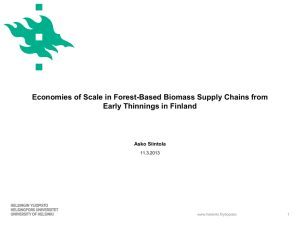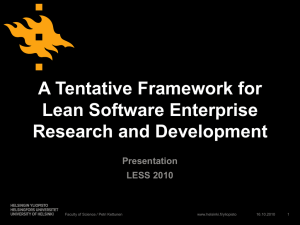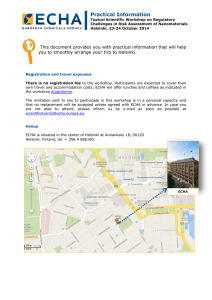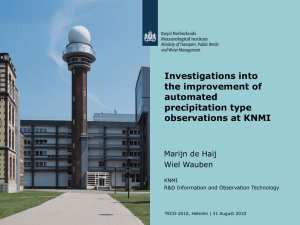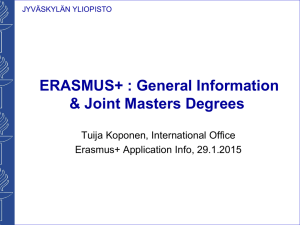Coded Signals
advertisement
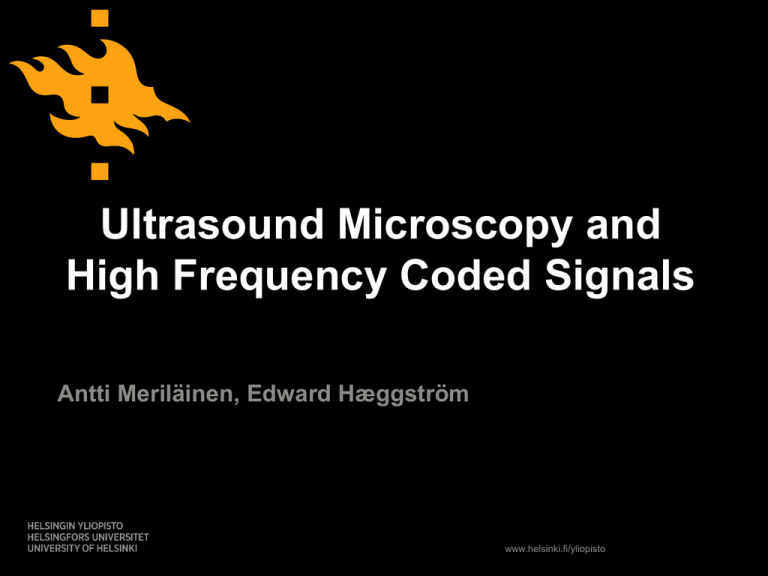
Ultrasound Microscopy and High Frequency Coded Signals Antti Meriläinen, Edward Hæggström www.helsinki.fi/yliopisto Ultrasound Microscopy What it is? • Using high frequency acoustic waves for mm-/µm-scale imaging • Method is non-destructive • It “Sees” inside the sample • Ultrasound images differences of acoustic impedances www.helsinki.fi/yliopisto Ultrasound Imaging Amplitude image TOF image www.helsinki.fi/yliopisto Ultrasound Microscopy Basic techniques Single transducer pulse-echo Phase Arrays http://en.wikipedia.org/wiki/Ultrasonic_testing http://www.nde.com/phased_array_technology.htm www.helsinki.fi/yliopisto Focused Ultrasound Transducer [Yu, Scanning acoustic microscopy and its applications to material characterization, 1995] www.helsinki.fi/yliopisto Tx/Rx for USM • TX • Pulser, delta spike excitation • Gated sinus wave ‒ For high frequencies ~1 GHz • RX • Protection circuit & Pre-amplifier • (Envelope detector / pulse shaper) • Oscilloscope Camacho, J., Fritsch, C.: ‘Protection circuits for ultrasound applications’ Ultrasonics, Ferroelectrics and Frequency Control, IEEE Transactions, 2008, 55, (5), pp.1160-1164 www.helsinki.fi/yliopisto Challenges with current techniques • Delta spike excitation • Stress for transducer and sample • Energy/amplitude variation with high PRF • Gated sinus • Stress for transducer and sample • Uncertainty of Time-of-Fly (TOF) ‒ Depth resolution www.helsinki.fi/yliopisto Coded USM •Coded signals •Electronics •Signal generation •Switch and timing •Preamplifier •Signal Synthesis •Ultrasound measurements •RF-design •Components •PCB layout www.helsinki.fi/yliopisto Coded Signals • Tx signal is wave packed • Frequency can be programmed • Phase can be programmed • Envelope (amplitude over time) can be programmed • Example linear frequency modulation (LFM)/chirp www.helsinki.fi/yliopisto Cross Correlation dt descript depth resolution dt depends on bandwidth dt www.helsinki.fi/yliopisto Coded Signal and SNR SNR =1 SNR =10 www.helsinki.fi/yliopisto Signal generation Numerical vector to Electric signal • Arbitrary waveform generators • Digital to Analog converter (DAC) • Bandwidth up to 120 MHz (2 GS/s) • If you have money: 5.6 GHz (24 GS/s) • High frequency signal generators • Output: continuous sine wave • Frequency range up to 4+ GHz • Narrow modulation bandwidth (less than 1 kHz) www.helsinki.fi/yliopisto Modulation techniques • Modulation = change carrier wave by signal • Amplitude modulation (AM) ‒ Quadrature amplitude modulation (QAM) • Frequency modulation (FM) • Phase Modulation (PM) • Many other …. Modulation www.helsinki.fi/yliopisto QAM / IQ-modulation • AM: • QAM: • www.helsinki.fi/yliopisto TRF370417 Modulator • Arbitrary/modulation bandwidth is 2*120 MHz ‒ dt = 4.2ns • Center output frequency is set by Local oscillator • Output Bandwidth is NOT maximum output frequency www.helsinki.fi/yliopisto Modulator outputs Q Lo I RF Out 1 cm www.helsinki.fi/yliopisto Carrier Feedthrough and Sideband Suppression www.helsinki.fi/yliopisto Preamplifier www.helsinki.fi/yliopisto Preamplifier Design • Amplification • Cascade design Modulator -> Attenuator(-60 dB) -> Preamplifier(+55 dB) • Voltage range • Max/Min signal input strenght • Impedance maching • Input impedance • Output impedance • DC-blocks • Capacitors and inductos for high frequencies • Same component can be tunet for different band www.helsinki.fi/yliopisto Switch and Timing • Receiving during transmission is impossible • Transducer delay line gives time limit for coded signal • Typically 0.3 – 5 µs • Signal generator limits coded length 8 µs • Maximize signal time and minimize switching time www.helsinki.fi/yliopisto Switch Circuit www.helsinki.fi/yliopisto Switch designing • Power handling • Bandwidth • Attenuation • Insertion loss (Smaller is better) • Isolation (Higher is better) • Switching time • Glitch • AC/DC coupling • Control voltages www.helsinki.fi/yliopisto Timing • Circuit based on AVR µController • Programmable • Predictable • Timing resolution is 62.5 ns • AVR trigs AWG and oscilloscope and controls the switches www.helsinki.fi/yliopisto Timing Circuit www.helsinki.fi/yliopisto Coded USM •Coded signals •Electronics •Signal generation •Switch and timing •Preamplifier •Signal Synthesis •Ultrasound measurements •RF-design •Components •PCB layout www.helsinki.fi/yliopisto Signal generation How to generate I and Q • I and Q are numerical signals that can be generated by Matlab LO cos LO sin RF X X LO cos Q AWG X LP LP Q I Matlab LO sin I X + I&Q RF Modulator www.helsinki.fi/yliopisto Results with 100 – 300 MHz Transmitted signal Received Aline www.helsinki.fi/yliopisto B-scan image 27/15 Results from 2010: 30 – 70 MHz Coded signal • Signal-to-noise ratios (SNR) of surface echoes were estimated to compare coded excitation and delta spike excitation • Preliminary results showed that coded chirp signal excitation increased mean SNR (16±3) dB for 75 MHz transducer Pulse-echo measurement using a coded 5 Vpp chirp signal excitation at 30-70 MHz (left) and a 33 Vpp delta spike excitation (right). The coded excitation increased mean SNR (16±3) dB. www.helsinki.fi/yliopisto Higher frequency and coded signals • Higher frequency gives resolution • Modulator shift arbitrary band (Not increase bandwidth) • Coded signals may improve SNR/CNR • Cross correlation is sensitive for noise which has same band than signal • Bad modulator can generated ”noise” (Feedthrough) • Effective bandwidth can be tuned by arbitrary code • Transducer bandwidth • Attenuation in immersion liquid • Arbitrary codes able multitone transmission www.helsinki.fi/yliopisto RF design • Impedance matching • Single-end vs. Differential signals • Available IC components: • Amplifiers • Attenuators • Switches • Modulators / Demodulators • Power detector • Clock generator (PLL/VCO) All components are SMD www.helsinki.fi/yliopisto Single-End vs. Differential signals • Differential signals: • • • • Single supply No ground loops Longer signal path Reduces common-mode noise (noise from ground) • Paired signal is required • Single There is amplifiers for conversion • Simpler design • (Dual supply) www.helsinki.fi/yliopisto Available IC components Amplifiers • Low noise (Pre. Amp.) • Noise figure <1dB • Gain ~20dB • Gain blocks • 50 Ω line driver • Power amplifier (Linear amplifier) • Differential amplifier • Variable gain amplifier (VGA) www.helsinki.fi/yliopisto Available IC components Modulators www.helsinki.fi/yliopisto Available IC components Modulators www.helsinki.fi/yliopisto


